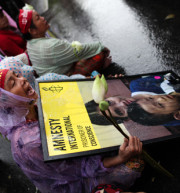
GENEVA – The United Nations Special Rapporteur on the rights of indigenous peoples, Victoria Tauli-Corpuz, today called on the United States to halt the construction of the Dakota Access Pipeline as it poses a significant risk to the drinking water of the Standing Rock Sioux Tribe and threatens to destroy their burial grounds and sacred sites. Special Rapporteur Maina Kiai has endorsed her call, along with a number of other UN experts. Ms. Tauli-Corpuz’s call comes after a temporary halt to construction and the recognition of the need to hold ‘government-to-government consultations’ made by the US Departments of the Army, Justice and of the Interior. The 1,172 mile (1,890 km) pipeline is being built by the US Army Corps of Engineers and the Energy Transfer LLC Corporation. “The tribe was denied access to information and excluded from consultations at the planning stage of the project and environmental assessments failed to disclose the presence and proximity of the Standing Rock Sioux Reservation,” the expert stressed. “The United States should, in accordance with its commitment to implement the Declaration on the rights on indigenous peoples*, consult with the affected communities in good faith and ensure their free, and informed consent prior to the approval of any project... Continue reading →

UN Special Rapporteur Maina Kiai convened an expert consultation in Geneva on December 9 to help shape the parameters of his next thematic report, which will be presented to the Human Rights Council in June 2014. The thematic report will focus on how laws and practices may discriminate against and exclude certain groups when exercising or seeking to exercise their rights to freedom of peaceful assembly and of association. The Geneva consultation was organized to focus on problems faced by specific groups that the Special Rapporteur and his team had identified as frequently at risk, including youth, women, LGBT individuals, indigenous peoples, minorities, refugees, migrants and other non-nationals/stateless persons, and persons with disabilities. This is, of course, a non-exhaustive list. As one of the participants in our consultation pointed out, all of us can face heightened risks in certain circumstances (as Kiai’s latest thematic report on elections makes clear). As the consultation participants shared their stories and expertise, however, it became clear that most groups face similar types of threats – at least broadly speaking – despite coming from different countries and advocating for different issues. These threats can be categorized, and given the large and diverse number of groups... Continue reading →

Six women working on women’s issues in Pakistan are killed in an ambush. A workshop for LGBT human rights defenders is disrupted by authorities in Uganda. Indigenous leaders in the Philippines are subject to a wave of harassment, threats and killings. Thirteen women in Cambodia are imprisoned for defending their community against corporate land-grabbing. And four migrant bus drivers in Singapore are charged with inciting an illegal strike. Exercising the rights to freedom of peaceful assembly and association can be dangerous for anyone, anywhere in the world. But sometimes – and in some places – the danger is elevated for certain groups. Maina Kiai’s next report as Special Rapporteur is expected to focus on exactly this subject: groups most at risk of attacks and reprisals when exercising their assembly and association rights. Kiai and his team are currently in the process of researching the report. As we begin work on the report, we would like to hear your views. Thus far, we have identified several groups as high-risk: women, youth, LGBT individuals, indigenous peoples, members of minority groups, persons with disabilities, migrants, and activists working for economic and social rights. Among these groups, which ones are most at risk in your country and for what reasons? What are... Continue reading →